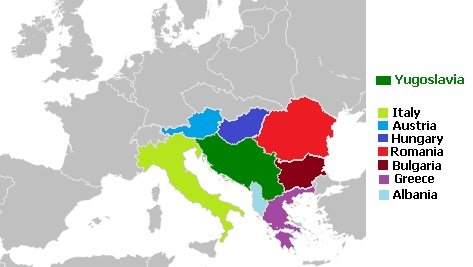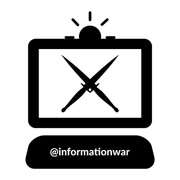Nazi's, Serbs, and Syrians..Part 2
Yugoslavia as it was known - was initially established after WW1.
It had fragmented during the second world war, as both internal and external in influences fought for power.
After WW2, it became the Yugoslavia that it was, until the 1990's.
This is taken from Wiki, the official version. (edited)
The Socialist Federal Republic of Yugoslavia (SFRY) was established under Jospeh Tito, who maintained a strongly authoritarian leadership that suppressed internal national identities of each area within the boundaries of what was Yugoslavia. The history of conflicts and tensions between in areas went back decades, to before WW1
After Tito's death in the 1980s, relations among the six republics of the SFRY deteriorated.
While Serbia sought to strengthen federal authority Croatia and Slovenia sought autonomy, and even independence.
As it became clearer that there was no solution agreeable to all parties, Slovenia and Croatia moved toward secession.
Tensions in Yugoslavia had been mounting since the early 1980s, it was 1990 that proved decisive.
With economic hardship, Yugoslavia was facing rising nationalism among its various ethnic groups.
By the early 1990s, there was no effective authority at the federal level.
Nice and tidy... Just like the victors like to portray things..
Now for some reality.
Ethnic tensions in this area's was an on going problem for decades, but not a crisis.
Inter generational resentments had been simmering, to some degree or other.
The various ethnic populations live quite peacefully side by side and marriage between different ethnic was not strange..It was relatively peaceful for decades.
Tito's authoritarian regime and perceived financial prosperity of the country (in comparison to the other socialist or communist regimes), made life very comfortable for the populations within the Yugoslavian national boundaries.
It was hailed as the socialist success.
Unfortunately for the Yugoslav peoples..
...that was total bullshit.
It was living of cheap money borrowed from, and supported by, the west.
As in any socialist political system, it was a house of cards. A facade.
Yugoslavia had been borrowing heavily from the IMF, and the international debt was crippling the economy over time..
.
The unraveling economic disaster befalling Yugoslavia increased pressure on already simmering tensions within the country.
The Yugoslavian economic dream of successful socialism was given to them by the western banks,
and it was a total set up by the banking system.
Tito fell for it. Although to be fair to Him, he was between a rock and a hard place.
Cheap money from the west - or communist take over from the east?
An unenviable position, but one He found himslef in..
Both meant occupation by foreign power's, but the monetary one also meant He could put off the pain of an occupation.
For a few decades anyway.
Money that has to be paid back - when not loaned using real business models, will cripples economies.
The banks know this.
The debt trap.
Governments can pretend that they do not know this... It's called Socialism.
Financial destruction was brought about differently to Germany after WW1, through reparation repayments.
These repayment were decided by the victorious nations, without any consultation to the German (Wiemar) nation.
The Wiemar (German) republic could never hope to repay on the terms given. They had no other choice than to accept.
They knew this.
The banks knew this.
The debt trap.
And so the Wiemar republic suffered hyperinflation and destabilization...and fertile ground for a strong political and military movements to emerge - to 'fight the oppressors' .
Along came Adolf Hitler.
A different route to ruination, but exactly the same end game, for Yugoslavia.
They never had a chance....
Following World War II, Tito's relationship with Stalin soured, and Yugoslavia turned to the United States to help rebuild its shattered country..
People far cleverer than Tito were pulling the strings and offering Him financial sweeties in the form of money...
The debt trap.
Yugoslavia was set up to fail...
...and the socialist government preferred to maintain the illusion of prosperity to it's people, rather than face the problem.
Again -in fairness to Tito, he had no real choices open to him.
They (Yugoslavia) were living off 'free money', and life was good – until it was time to pay back borrowed money from the IMF (central banks), the currency collapsed.
By 1988, the national debt totaled $33 billion USD.
Inflation -which had averaged around 200 per cent through the late 1980s, soared to 1300 per cent by 1989.
The dinar had become worthless, and Yugoslavia ceased to be a single economy.
Divisions started to appear. The wealthier northern provinces started feel a growing dissatisfaction and resentment.
….'The fruits of whose productivity were transferred to the dusty climates of the south where they rotted in sun.'.
The socialist utopia was starting to come apart.
(Frustration's of the economic imbalance and the forced economic redistribution had already boiled over earlier in 1971. Thousands of Zagreb students protested on the streets for greater Croatian autonomy. Tito soon put down the protests, with many imprisoned).
Tito then tried to decentralize the economy after 1974. Trying to decentralize an economy after it has been built on money that was borrowed and distributed evenly, irrelevant of any economic reality, only increased the inevitable decline.
To be able to try to renegotiate foreign debt, the government introduced severe austerity. The debt trap had been well and truly sprung.
The banks were not letting them get away.
After the 'cold war', aid from the US was cut. The pretense' of the withdrawal of any financial help, was due to the decline in threat from the Eastern Bloc,
That was bullshit to. This was tightening the noose.
They reality was, is that they were starting to strangle Yugoslavia.
Like any junkie cut off from their drug (cheap money from the west), panic set in, and the country collapsed..
Free money doesn't exist, and the Yugoslavs found out that the drug that they had been given since the second world war, in terms of IMF loans, was a painful one to kick.
More than a decade of austerity and declining living standards had corroded the social fabric.
The 'rights' and 'security' that individuals and families had come to rely on, as a given - were now suddenly gone.
Reality now took the place of the illusion.
An illusion that had been created by borrowing money from the west.
Tito had no choice as far as I see it. He was screwed right from the beginning.
So whether it was money from the west whose debtors call in the debt, or 'repayments' from a war that could never, ever be repaid, the results were the same.
...Strong leaders emerge, a strong sense of nationalism emerges, and an anger emerges at perceived injustices.....
All that is required now to ignite these building tensions, is a human story.
Oppression of the Germans in the Sudetenland, or repression of voices calling for autonomy in ethnically different states of the same country... all it needs are sparks to start the fire...
Former CIA agent Robert Baer.
Q: Where and when was your first job in Yugoslavia?
I arrived by helicopter with three agents. We landed on 12 January 1991 in Sarajevo. Our job was to keep an eye on 'alleged terrorists' of Serbian nationality, who were expected to attack Sarajevo.
Q: Did that group ever exist and what exactly you were doing in Sarajevo under CIA command?
No such group ever existed. Our headquarters lied to us.
Our mission was to alarm and spread panic among politicians in Bosnia, simply to fill their heads with the idea that Serbs would attack. To begin with, we accepted the story, but after a while we started to wonder. Why were we raising such hysteria when the group clearly did not exist?
Q:How and when did the mission end and did it have a name?
For me it ended after two weeks, I landed a new job in Slovenia. The operation lasted a month and had the name “Istina” (i.e. “truth”) although it was anything but
Q: Why did you go to Slovenia?
I received instructions that Slovenia was ready to declare independence. We were given money, a few million dollars, to fund various NGOs, opposition parties and various politicians who have inflamed hatred.
The banks know what they are doing...
Part 3 - the war in the 1990's and what it really means...





Curated for #informationwar (by @openparadigm)

Relevance: History
Our Purpose